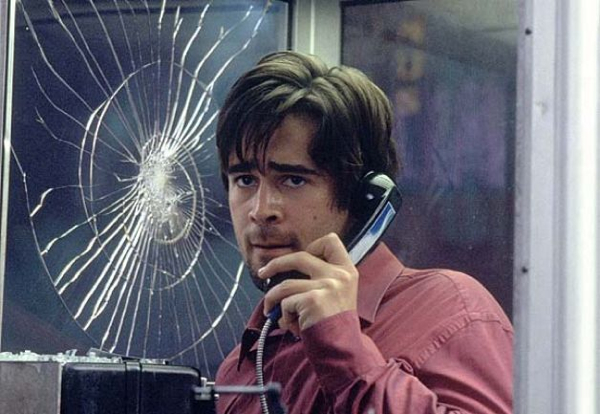Movie review by Greg Carlson
Writer Larry Cohen and director Joel Schumacher are both known for peddling pulp fictions to audiences who may or may not want the wares, and now, following a decades-long gestation period, Cohen’s strident and nutty story has been realized on the big screen. Schumacher, grasping the anachronism of a man trapped in a phone booth, justifies the break in logic by raining down a shower of opening images that bounce from the teeming masses on their cell phones to the satellites on high that provide the connections. Kieslowski did the same thing much better in “Red,” but Schumacher understands that he has to hit the ground running if he is going to hook the audience.
Scruffy Colin Farrell is well-cast as PR hustler Stu Shepard, the devilish offspring of Sidney Falco from “Sweet Smell of Success.” A wannabe kingmaker, Stu struts the pavement of Times Square, browbeating his fawning toady of an assistant while juggling an endless stream of calls from clients, magazine editors, and other pretenders. Stu has a crush on one of his marks, adorable actress Pam (Katie Holmes), and calls her daily from the last working phone booth in his orbit, because he is married, and knows his wife checks the cell phone bills.
Even with its breakneck set-up, “Phone Booth” hits the wall as soon as Stu picks up the ringing phone following one of his many calls to Pam. A voice on the other end of the line (Kiefer Sutherland, at his smarmiest) calmly explains that he has a high-powered rifle, and will kill Stu if he dares to hang up. Stu’s incredulity evaporates along with his swagger when the sniper proves he is not joking around. An innocent bystander is shot, and soon the entire street is swarming with cops, news vans, and curious onlookers rolling tape in their camcorders. Fortunately for our protagonist, attending officer Captain Ramey (Forest Whitaker) is able to figure out that Stu is the victim and not the killer.
What follows, is messy, ill-conceived, and woefully set-bound, as Stu and the sniper play a verbal game of cat and mouse. Farrell, sporting an occasionally spotty Bronx accent, rips it up with reckless abandon: crying, sweating, screaming, and begging, his Stu is an actor’s dream role. Ditto for the unseen Sutherland, who just sits back and pours it out like honey. The relationship of the two men is problematic, however, as the sniper feels that Stu’s lack of compassion, honesty, and responsible moral behavior is enough to mark him for death.
What “Phone Booth” chooses to sidestep, to its detriment, is any reasonable explanation as to why the sniper knows so much (or even cares) about Stu in the first place. Tantalizing details of Stu’s moral shortcomings are peppered throughout the phone conversation, and occasionally Stu takes a wild guess at the sniper’s connection to him, but the movie purposefully elects to leave the information a secret. Maybe Cohen and Schumacher want to keep the movie’s themes in the realm of fable. If so, the filmmakers left out one important ingredient: a reason why we should care about Stu Shepard in the first place.
